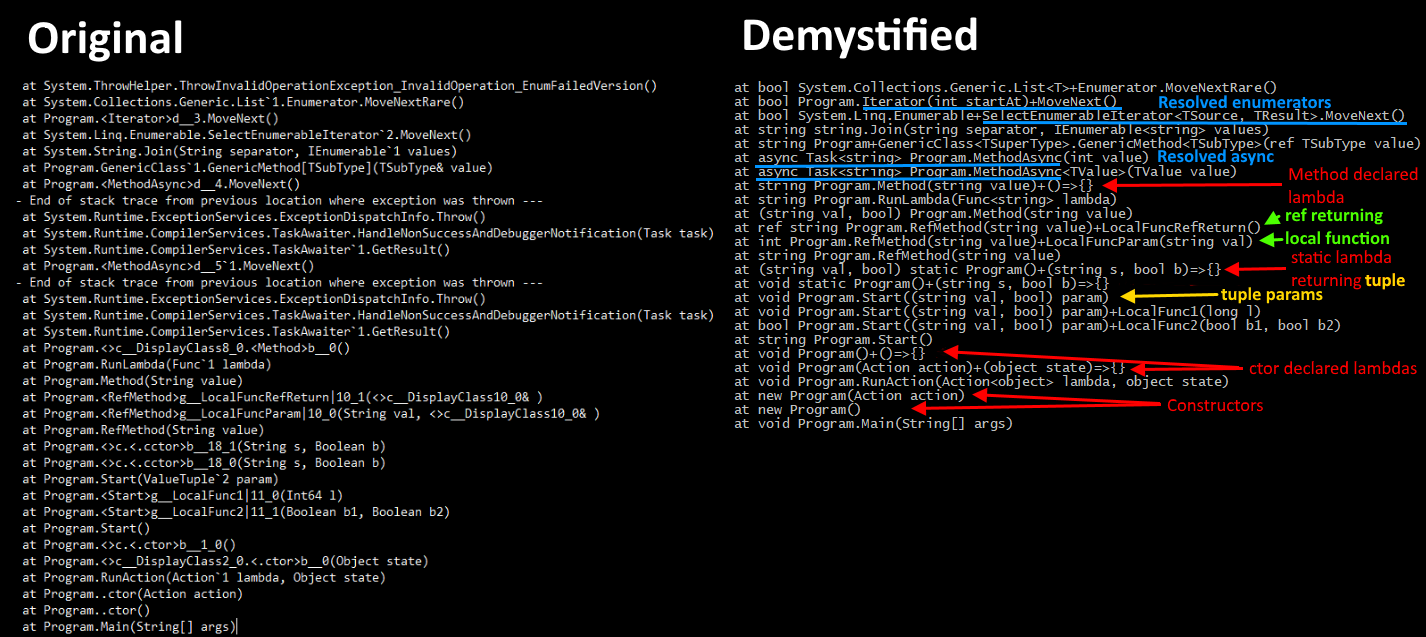Ben.Demystifier
High performance understanding for stack traces
.NET stack traces output the compiler transformed methods; rather than the source code methods, which make them slow to mentally parse and match back to the source code.
The current output was good for C# 1.0; but has become progressively worse since C# 2.0 (iterators, generics) as new features are added to the .NET languages and at C# 7.1 the stack traces are esoteric (see: Problems with current stack traces).
Make error logs more productive
Output the modern C# 7.0 features in stack traces in an understandable fashion that looks like the source code that generated them.
Usage
exception.Demystify()
Or instead of Environment.StackTrace
EnhancedStackTrace.Current()
Resolves the stack back to the C# source format of the calls (and is an inspectable list of stack frames)
Calling .ToString() on the Demystified exception will produce a string stacktrace similar to the following (without the comments):
System.InvalidOperationException: Collection was modified; enumeration operation may not execute.
at bool System.Collections.Generic.List<T>+Enumerator.MoveNextRare()
at IEnumerable<string> Program.Iterator(int startAt)+MoveNext() // Resolved enumerator
at bool System.Linq.Enumerable+SelectEnumerableIterator<TSource, TResult>.MoveNext() // Resolved enumerator
at string string.Join(string separator, IEnumerable<string> values)
at string Program+GenericClass<TSuperType>.GenericMethod<TSubType>(ref TSubType value)
at async Task<string> Program.MethodAsync(int value) // Resolved async
at async Task<string> Program.MethodAsync<TValue>(TValue value) // Resolved async
at string Program.Method(string value)+()=>{} [0] // lambda source + ordinal
at string Program.Method(string value)+()=>{} [1] // lambda source + ordinal
at string Program.RunLambda(Func<string> lambda)
at (string val, bool) Program.Method(string value) // Tuple returning
at ref string Program.RefMethod(in string value)+LocalFuncRefReturn() // ref return local func
at int Program.RefMethod(in string value)+LocalFuncParam(string val) // local function
at string Program.RefMethod(in string value) // in param (readonly ref)
at (string val, bool) static Program()+(string s, bool b)=>{} // tuple return static lambda
at void static Program()+(string s, bool b)=>{} // void static lambda
at void Program.Start((string val, bool) param) // Resolved tuple param
at void Program.Start((string val, bool) param)+LocalFunc1(long l) // void local function
at bool Program.Start((string val, bool) param)+LocalFunc2(bool b1, bool b2) // bool return local function
at string Program.Start()
at void Program()+()=>{} // ctor defined lambda
at void Program(Action action)+(object state)=>{} // ctor defined lambda
at void Program.RunAction(Action<object> lambda, object state)
at new Program(Action action) // constructor
at new Program() // constructor
at void Program.Main(String[] args) Calling .ToString() on the same exception would produce the following output
System.InvalidOperationException: Collection was modified; enumeration operation may not execute.
at System.ThrowHelper.ThrowInvalidOperationException_InvalidOperation_EnumFailedVersion() // ? low value
at System.Collections.Generic.List`1.Enumerator.MoveNextRare()
at Program.<Iterator>d__3.MoveNext() // which enumerator?
at System.Linq.Enumerable.SelectEnumerableIterator`2.MoveNext() // which enumerator?
at System.String.Join(String separator, IEnumerable`1 values)
at Program.GenericClass`1.GenericMethod[TSubType](TSubType& value)
at Program.<MethodAsync>d__4.MoveNext() // which async overload?
--- End of stack trace from previous location where exception was thrown --- // ? no value
at System.Runtime.ExceptionServices.ExceptionDispatchInfo.Throw() // ? no value
at System.Runtime.CompilerServices.TaskAwaiter.HandleNonSuccessAndDebuggerNotification(Task task) // ? no value
at System.Runtime.CompilerServices.TaskAwaiter`1.GetResult() // ? no value
at Program.<MethodAsync>d__5`1.MoveNext() // which async overload?
--- End of stack trace from previous location where exception was thrown --- // ? no value
at System.Runtime.ExceptionServices.ExceptionDispatchInfo.Throw() // ? no value
at System.Runtime.CompilerServices.TaskAwaiter.HandleNonSuccessAndDebuggerNotification(Task task) // ? no value
at System.Runtime.CompilerServices.TaskAwaiter`1.GetResult() // ? no value
at Program.<>c__DisplayClass8_0.<Method>b__0() // ¯\_(ツ)_/¯
at Program.<>c__DisplayClass8_0.<Method>b__1() // ¯\_(ツ)_/¯
at Program.RunLambda(Func`1 lambda)
at Program.Method(String value)
at Program.<RefMethod>g__LocalFuncRefReturn|10_1(<>c__DisplayClass10_0& ) // local function
at Program.<RefMethod>g__LocalFuncParam|10_0(String val, <>c__DisplayClass10_0& ) // local function
at Program.RefMethod(String value)
at Program.<>c.<.cctor>b__18_1(String s, Boolean b) // ¯\_(ツ)_/¯
at Program.<>c.<.cctor>b__18_0(String s, Boolean b) // ¯\_(ツ)_/¯
at Program.Start(ValueTuple`2 param) // Tuple param?
at Program.<Start>g__LocalFunc1|11_0(Int64 l) // local function
at Program.<Start>g__LocalFunc2|11_1(Boolean b1, Boolean b2) // local function
at Program.Start()
at Program.<>c.<.ctor>b__1_0() // ¯\_(ツ)_/¯
at Program.<>c__DisplayClass2_0.<.ctor>b__0(Object state) // ¯\_(ツ)_/¯
at Program.RunAction(Action`1 lambda, Object state)
at Program..ctor(Action action) // constructor
at Program..ctor() // constructor
at Program.Main(String[] args)Which is far less helpful, and close to jibberish in places
Problems with current stack traces:
-
constructors
Does not match code, output as
.ctorand.cctor -
parameters
Do not specify qualifier
ref,outorin -
iterators
Cannot determine overload
<Iterator>d__3.MoveNext()rather thanIterator(int startAt)+MoveNext() -
Linq
Cannot determine overload
Linq.Enumerable.SelectEnumerableIterator``2.MoveNext()rather than
Linq.Enumerable+SelectEnumerableIterator<TSource, TResult>.MoveNext() -
async
Cannot determine overload and no modifier such as
async<MethodAsync>d__5``1.MoveNext()rather than
async Task<string> Program.MethodAsync(int value)Noise!
--- End of stack trace from previous location where exception was thrown --- at System.Runtime.ExceptionServices.ExceptionDispatchInfo.Throw() at System.Runtime.CompilerServices.TaskAwaiter.ThrowForNonSuccess(Task task) at System.Runtime.CompilerServices.TaskAwaiter.HandleNonSuccessAndDebuggerNotification(Task task) at System.Runtime.CompilerServices.TaskAwaiter.ValidateEnd(Task task) at System.Runtime.CompilerServices.TaskAwaiter.GetResult() -
lambdas
Mostly jibberish
<>c__DisplayClass2_0.<.ctor>b__0(Object state)with a suggestion of where they are declared but no hint if there are multiple overloads of the method. -
local functions
Mostly jibberish
<RefMethod>g__LocalFuncParam|10_0(String val, <>c__DisplayClass10_0& )with a suggestion of where they are declared but no hint if there are multiple overloads of the method. -
generic parameters
Not resolved, only an indication of the number
RunLambda(Func``1 lambda)rather thanRunLambda(Func<string> lambda) -
value tuples
Do not match code, output as
ValueTuple``2 paramrather than(string val, bool) param -
primitive types
Do not match code, output as
Int64,Boolean,Stringrather thanlong,bool,string -
return types
Skipped entirely from method signature
Benchmarks
To run benchmarks from the repository root:
dotnet run -p .\test\Ben.Demystifier.Benchmarks\ -c Release -f netcoreapp2.0 All
Note: we're only kicking off via netcoreapp2.0, benchmarks will run for all configured platforms like net462.

